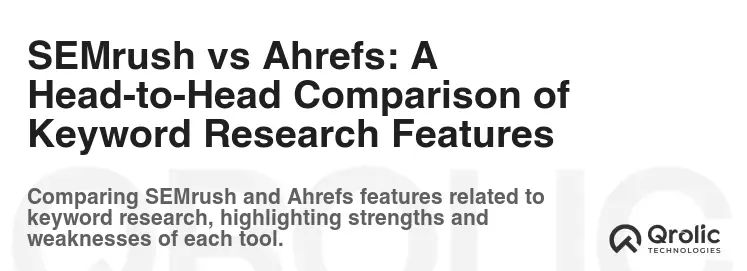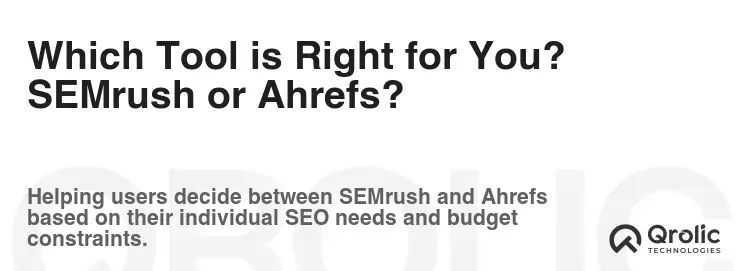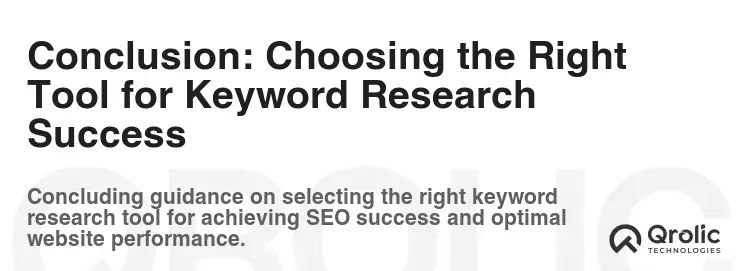Choosing the right SEO tool is like picking the perfect co-pilot for your digital journey. You need someone reliable, insightful, and capable of navigating the ever-changing landscape of search engine optimization. Two names consistently rise to the top when discussing comprehensive SEO platforms: SEMrush and Ahrefs. This article dives deep into the heart of these two giants, specifically focusing on their keyword research capabilities, to help you determine which tool best suits your needs and propels your website towards SEO success.
Quick Summary:
- SEMrush and Ahrefs are leading SEO keyword research tools.
- SEMrush suits beginners; Ahrefs provides in-depth data.
- Choose based on your needs, budget, and experience level.
- Combining both tools offers comprehensive SEO insights.
Table of Contents
- Understanding the Importance of Keyword Research
- SEMrush vs Ahrefs: A Head-to-Head Comparison of Keyword Research Features
- 1. Keyword Research Tools and Databases
- 2. Keyword Difficulty Analysis
- 3. Keyword Idea Generation
- 4. Search Volume Data
- 5. Competitor Keyword Analysis
- 6. Keyword Grouping and Organization
- 7. Reporting and Data Export
- 8. User Interface and User Experience
- Beyond Keyword Research: Other SEO Features
- Pricing and Value for Money
- Which Tool is Right for You? SEMrush or Ahrefs?
- A Practical Example: Using SEMrush and Ahrefs for Keyword Research
- The Role of Qrolic Technologies in Your SEO Journey
- Conclusion: Choosing the Right Tool for Keyword Research Success
Understanding the Importance of Keyword Research

Before we pit SEMrush and Ahrefs against each other, let’s solidify why keyword research is the cornerstone of any successful SEO strategy. Imagine trying to build a house without a blueprint. You might end up with something, but it likely won’t be structurally sound or meet your needs. Keyword research is your blueprint for online visibility.
What is Keyword Research?
Keyword research is the process of identifying the words and phrases people use when searching for information online related to your business, products, or services. It’s about understanding the language of your target audience and aligning your website content to match their search intent.
Why is Keyword Research Crucial?
- Attract the Right Audience: By targeting keywords your ideal customers are actively searching for, you increase the chances of attracting qualified leads to your website. This means more potential customers who are genuinely interested in what you have to offer.
- Improve Search Engine Rankings: Search engines like Google use keywords to understand the content of your website and determine its relevance to user queries. Using the right keywords in your content, meta descriptions, and other on-page elements helps search engines understand what your website is about, leading to higher rankings.
- Understand Searcher Intent: Keyword research isn’t just about finding popular keywords; it’s about understanding why people are searching for them. Are they looking to buy something, find information, or compare products? Understanding the intent behind a keyword allows you to create content that perfectly addresses the user’s needs.
- Content Creation Guidance: Keyword research provides invaluable insights into the topics your audience is interested in. This allows you to create blog posts, articles, videos, and other content that resonates with your target market and provides them with value.
- Competitive Analysis: Analyzing the keywords your competitors are targeting can reveal valuable opportunities for your own SEO strategy. You can identify gaps in their content, uncover new keyword opportunities, and potentially outrank them in search results.
- Data-Driven Decision Making: Keyword research provides data-backed insights that inform your entire SEO strategy. You’re not just guessing what might work; you’re making informed decisions based on real user search behavior.
SEMrush vs Ahrefs: A Head-to-Head Comparison of Keyword Research Features

Now that we’ve established the importance of keyword research, let’s dive into the core of this article: a detailed comparison of SEMrush and Ahrefs’ keyword research capabilities. We’ll examine their key features, strengths, weaknesses, and overall effectiveness in helping you uncover valuable keyword opportunities.
1. Keyword Research Tools and Databases
- SEMrush: SEMrush boasts a vast keyword database, regularly updated with fresh data. Its primary keyword research tool, the “Keyword Magic Tool,” is a powerhouse for generating keyword ideas. It allows you to enter a seed keyword and then filters and refines the results based on various parameters, such as search volume, keyword difficulty, intent, and related questions. SEMrush also offers tools like the “Keyword Overview” and “Position Tracking” to analyze existing keywords and monitor your website’s ranking performance. SEMrush boasts data for over 142 geographic databases.
- Ahrefs: Ahrefs also maintains a massive keyword database and offers several tools for keyword research, including the “Keywords Explorer.” This tool provides detailed information about keywords, including search volume, keyword difficulty, click-through rate, and SERP features. Ahrefs’s “Site Explorer” tool is also excellent for identifying keywords that your competitors are ranking for. Their keyword data is collected from over 171 countries.
Verdict: Both SEMrush and Ahrefs have extensive keyword databases, but they approach data presentation differently. SEMrush is often praised for its user-friendly interface and visually appealing reports. Ahrefs, while also user-friendly, focuses on providing in-depth data and detailed analysis, particularly regarding backlinks and competitive analysis.
2. Keyword Difficulty Analysis
- SEMrush: SEMrush’s “Keyword Difficulty” score provides an estimate of how difficult it would be to rank on the first page of Google for a particular keyword. The score is based on factors like the authority of the websites currently ranking, the number of backlinks pointing to those pages, and the on-page optimization of those pages.
- Ahrefs: Ahrefs also offers a “Keyword Difficulty” score, which estimates the number of backlinks needed to rank in the top 10 search results for a given keyword. This score is based on an analysis of the top-ranking pages and their backlink profiles.
Verdict: Both tools provide keyword difficulty scores, but they use different methodologies. SEMrush’s score considers a broader range of factors, while Ahrefs’ score focuses primarily on backlinks. It’s important to consider both scores and use them as a general guideline, rather than a definitive measure of ranking difficulty. Ideally you can use both the tool to measure the keyword difficulty score.
3. Keyword Idea Generation
- SEMrush: The “Keyword Magic Tool” in SEMrush is a standout for keyword idea generation. It allows you to generate a massive list of related keywords, long-tail keywords, and questions based on your seed keyword. You can also use filters to narrow down the results based on specific criteria, such as search volume or keyword difficulty. SEMrush also has a “Topic Research” tool which is focused on creating content ideas based on trending topics and related questions.
- Ahrefs: Ahrefs’ “Keywords Explorer” also offers keyword idea generation features. It provides suggestions for related keywords, questions, and “also rank for” keywords, which are keywords that websites ranking for your target keyword also rank for. It also helps find “search suggestions” which are based on what people search on search engines.
Verdict: Both tools are effective for generating keyword ideas, but SEMrush’s “Keyword Magic Tool” is particularly strong for uncovering a large volume of relevant and diverse keyword suggestions. Ahrefs excels at providing insights into the keywords your competitors are already ranking for, offering a competitive edge.
4. Search Volume Data
- SEMrush: SEMrush provides search volume data for keywords, which indicates the average number of monthly searches for a particular keyword. This data helps you prioritize keywords with higher search volume, as they have the potential to drive more traffic to your website. SEMrush uses a proprietary algorithm to estimate search volume, taking into account various factors, such as historical search data and seasonality.
- Ahrefs: Ahrefs also provides search volume data for keywords, which is essential for identifying high-potential keywords. Ahrefs’ search volume data is based on clickstream data, which is collected from real users’ search behavior. They also update their search volume data every month.
Verdict: Both tools provide valuable search volume data, but it’s important to remember that search volume is just an estimate. There can be discrepancies between the search volume data provided by different tools, so it’s best to use it as a general guideline rather than a precise measurement.
5. Competitor Keyword Analysis
- SEMrush: SEMrush’s “Competitive Research” toolkit allows you to analyze your competitors’ websites and identify the keywords they are ranking for. This can reveal valuable opportunities for your own SEO strategy, as you can target the same keywords or find gaps in their content. It also helps to analyze competitor backlinks.
- Ahrefs: Ahrefs’ “Site Explorer” is a powerful tool for analyzing your competitors’ websites and identifying their top-ranking keywords. You can also see the backlinks pointing to their pages, which can provide insights into their link-building strategies. Ahrefs’ “Content Gap” tool is particularly useful for identifying keywords that your competitors are ranking for, but you are not.
Verdict: Both tools are excellent for competitor keyword analysis. SEMrush provides a broader overview of your competitors’ online presence, including their advertising strategies and social media activity. Ahrefs excels at providing in-depth data about their backlink profiles and content strategies.
6. Keyword Grouping and Organization
- SEMrush: SEMrush allows you to create keyword lists and group keywords based on various criteria, such as topic, intent, or keyword difficulty. This helps you organize your keyword research and prioritize your efforts. It has an intuitive interface for tagging and organization
- Ahrefs: Ahrefs also allows you to create keyword lists and organize them into projects. You can also tag keywords and add notes to track your progress. Its bulk analysis feature also helps to analyze multiple keywords in one shot.
Verdict: Both tools offer features for keyword grouping and organization, which are essential for managing large keyword lists and streamlining your SEO workflow. SEMrush’s interface is generally considered more user-friendly, while Ahrefs offers more advanced features for project management.
7. Reporting and Data Export
- SEMrush: SEMrush offers a variety of reporting options, allowing you to create custom reports based on your specific needs. You can also export data in various formats, such as CSV or PDF. Its scheduling feature is also a time saver.
- Ahrefs: Ahrefs also offers robust reporting capabilities, allowing you to track your keyword rankings, website traffic, and other key metrics. You can also export data in various formats. Its data visualization is considered superior by many SEO experts.
Verdict: Both tools provide comprehensive reporting and data export options, allowing you to track your progress and share your findings with your team or clients.
8. User Interface and User Experience
- SEMrush: SEMrush is known for its user-friendly interface and visually appealing reports. The dashboard is well-organized and easy to navigate, making it simple to find the tools and information you need.
- Ahrefs: Ahrefs also has a user-friendly interface, but it is generally considered more data-focused. The interface is clean and intuitive, but it may take some time to get used to the sheer volume of data available.
Verdict: User interface preference is subjective, but SEMrush is often praised for its ease of use, particularly for beginners. Ahrefs provides a more data-rich experience, which may appeal to more experienced SEO professionals.
Beyond Keyword Research: Other SEO Features

While this article focuses on keyword research, it’s important to remember that SEMrush and Ahrefs are comprehensive SEO platforms that offer a wide range of other features, including:
- Site Audits: Both tools can crawl your website and identify technical SEO issues that may be affecting your rankings.
- Backlink Analysis: Both tools provide detailed information about your website’s backlink profile, including the quality and quantity of backlinks.
- Rank Tracking: Both tools allow you to track your website’s ranking for specific keywords over time.
- Content Analysis: Both tools can analyze your website content and provide recommendations for improvement.
- Social Media Management (SEMrush): SEMrush offers tools for managing your social media presence, including scheduling posts and tracking engagement.
- PPC Advertising Analysis (SEMrush): SEMrush allows you to analyze your competitors’ PPC advertising campaigns and identify opportunities for your own campaigns.
Pricing and Value for Money

Both SEMrush and Ahrefs offer different pricing plans depending on your needs and budget.
- SEMrush: SEMrush offers a variety of plans, ranging from a free trial to enterprise-level solutions. Their plans are typically priced based on the number of projects, keywords, and reports you need.
- Ahrefs: Ahrefs also offers a range of plans, with pricing based on the number of crawls, reports, and tracked keywords.
Verdict: Both tools are relatively expensive, but they offer a significant return on investment for businesses that are serious about SEO. The best option for you will depend on your specific needs and budget. It’s recommended to try their free trials or explore their free versions to see which tool best fits your workflow.
Which Tool is Right for You? SEMrush or Ahrefs?

The “best” SEO tool for keyword research ultimately depends on your individual needs and priorities. Here’s a breakdown to help you decide:
Choose SEMrush if:
- You’re a beginner looking for a user-friendly interface and visually appealing reports.
- You need a comprehensive SEO platform that includes tools for keyword research, site audits, rank tracking, content analysis, social media management, and PPC advertising analysis.
- You want a powerful keyword research tool that can generate a large volume of keyword ideas.
- You need competitor analysis features that provide a broad overview of their online presence.
Choose Ahrefs if:
- You’re an experienced SEO professional who needs in-depth data and detailed analysis.
- You’re particularly focused on backlink analysis and competitive research.
- You want a keyword research tool that provides accurate search volume data based on clickstream data.
- You need a content gap analysis tool to identify keywords your competitors are ranking for, but you are not.
Consider Both if:
- You have a significant budget and need access to the best possible data and features.
- You want to leverage the strengths of both tools for a comprehensive SEO strategy.
A Practical Example: Using SEMrush and Ahrefs for Keyword Research

Let’s illustrate how to use both SEMrush and Ahrefs to conduct keyword research for a hypothetical business: a local bakery specializing in custom cakes.
Scenario: You want to increase online visibility and attract more customers to your bakery’s website.
Step 1: Brainstorm Seed Keywords
Start by brainstorming relevant seed keywords, such as:
- Custom cakes
- Cake bakery near me
- Birthday cakes
- Wedding cakes
- Cupcakes
Step 2: Use SEMrush’s Keyword Magic Tool
- Enter “custom cakes” into the SEMrush Keyword Magic Tool.
- Explore the generated keyword ideas, including related keywords, long-tail keywords, and questions.
- Filter the results based on search volume, keyword difficulty, and intent.
- Identify high-potential keywords, such as:
- “custom cakes [city name]”
- “unique birthday cakes”
- “affordable wedding cakes”
- “custom cupcake designs”
- Analyze the search volume and keyword difficulty for each keyword.
Step 3: Use Ahrefs’ Keywords Explorer
- Enter the same seed keyword (“custom cakes”) into Ahrefs’ Keywords Explorer.
- Explore the generated keyword ideas, including related terms, questions, and “also rank for” keywords.
- Analyze the search volume, keyword difficulty, and click-through rate for each keyword.
- Identify additional high-potential keywords, such as:
- “vegan custom cakes”
- “gluten-free birthday cakes”
- “custom cakes for corporate events”
- Use Ahrefs’ “Content Gap” tool to identify keywords your competitors are ranking for, but you are not.
Step 4: Analyze Competitor Keywords
- In SEMrush, use the “Competitive Research” toolkit to analyze your competitors’ websites and identify the keywords they are ranking for.
- In Ahrefs, use the “Site Explorer” to analyze your competitors’ websites and identify their top-ranking keywords and backlinks.
- Identify any gaps in your content and target keywords that your competitors are successfully ranking for.
Step 5: Group and Organize Keywords
- Create keyword lists in both SEMrush and Ahrefs to group keywords based on topic, intent, or keyword difficulty.
- Prioritize your efforts based on the potential traffic and ranking difficulty of each keyword.
Step 6: Create Content
- Create high-quality, informative content that targets your chosen keywords.
- Optimize your website content, meta descriptions, and other on-page elements with relevant keywords.
Step 7: Track Your Progress
- Use SEMrush and Ahrefs to track your website’s ranking for your target keywords over time.
- Monitor your website traffic and conversions to measure the effectiveness of your keyword research efforts.
By following these steps, you can leverage the power of both SEMrush and Ahrefs to conduct comprehensive keyword research and improve your website’s search engine rankings.
The Role of Qrolic Technologies in Your SEO Journey

At Qrolic Technologies (https://qrolic.com/), we understand the importance of effective keyword research and its impact on overall SEO success. As a leading provider of digital marketing solutions, we leverage the power of tools like SEMrush and Ahrefs to help our clients achieve their online goals.
How Qrolic Technologies Can Help You:
- Expert Keyword Research: Our team of experienced SEO professionals utilizes SEMrush and Ahrefs to conduct in-depth keyword research, identifying high-potential keywords that drive targeted traffic to your website.
- Comprehensive SEO Strategy: We develop customized SEO strategies based on your specific business needs and goals, incorporating keyword research, on-page optimization, link building, and content marketing.
- Technical SEO Audits: We perform technical SEO audits using SEMrush and Ahrefs to identify and fix any technical issues that may be affecting your website’s rankings.
- Competitive Analysis: We analyze your competitors’ websites and identify their top-ranking keywords, backlinks, and content strategies, providing you with a competitive edge.
- Content Creation: Our team of skilled content writers creates high-quality, engaging content that targets your chosen keywords and provides value to your target audience.
- Link Building: We implement effective link-building strategies to increase your website’s authority and improve its search engine rankings.
- Performance Tracking and Reporting: We track your website’s performance using SEMrush and Ahrefs and provide you with regular reports that demonstrate the effectiveness of our SEO efforts.
Whether you’re a small business looking to improve your local SEO or a large enterprise seeking to dominate your industry, Qrolic Technologies can help you achieve your online goals. Contact us today to learn more about our SEO services and how we can help you grow your business.
Conclusion: Choosing the Right Tool for Keyword Research Success

In the battle of SEMrush vs Ahrefs for keyword research, there’s no clear “winner.” Both tools offer a wealth of features and data that can help you uncover valuable keyword opportunities and improve your website’s search engine rankings.
The best choice for you will depend on your individual needs, priorities, and budget. Consider your experience level, the types of features you need, and the size of your business when making your decision. Ultimately, the most important thing is to choose a tool that you feel comfortable using and that provides you with the data and insights you need to make informed SEO decisions. And remember, whether you choose SEMrush, Ahrefs, or even a combination of both, continuous learning and adaptation are key to success in the ever-evolving world of SEO.






